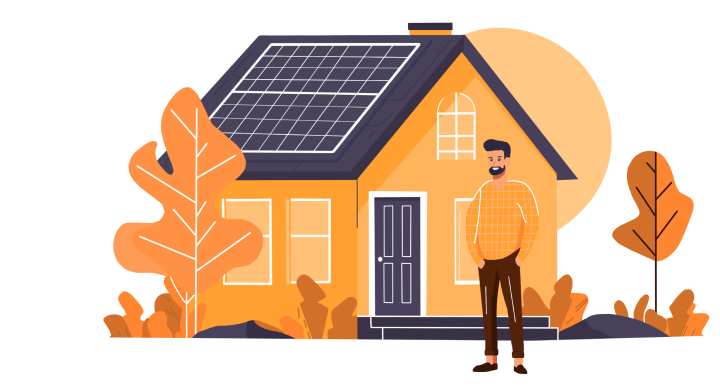It's not only important to understand the average cost of installing solar panels but also how to lower this initial upfront investment.
Here at Solar Energy Host, we're all about making the switch to solar more accessible and affordable. Read on as we discuss the factors influencing solar panel costs and get some practical advice on how to manage them effectively.
Step #1: Look at your options for financing and incentives.
Are there tax credits you can get for installing solar?
Tax credits can make solar panel pricing more affordable. Installing solar panels can be a significant financial commitment, but government programs can ease the burden.
Federal tax credits, often called the Investment Tax Credit (ITC), allow eligible homeowners to deduct a substantial portion of their solar system's cost from their federal taxes. This valuable incentive reduces the initial outlay, making it easier for many households to go solar.
Essentially, one way to minimize the average cost of installing solar panels is to take advantage of tax credits, which are like getting a discount on the total solar installation cost through your tax return.
Are there state and local incentives for homeowners with solar panels?
In addition to federal tax credits, many state and local governments provide their own incentives to make going solar even more attractive. These can take the form of additional tax credits, rebates or performance-based incentives.
For example, local utility companies might offer cash rebates or credits on your bill for generating your own electricity. These programs can significantly reduce your costs, so it's worth researching what's available in your area.
Do you qualify for any existing solar loans?
Lastly, solar loans can make the transition to a solar energy system more financially manageable.
Funding the installation of home solar panels through a solar loan allows you to spread out the cost over time. Much like a home or car loan, a solar loan enables you to borrow the necessary funds for your solar installation and repay in fixed installments. This not only makes it easier on your cash flow but also lets you start saving on energy bills sooner rather than later.
Some solar companies even provide their own financing options, making the switch both flexible and affordable when it comes to the average cost of installing solar panels.
Step #2: Find out which factors influence the cost of installing solar.
Consider your system's potential size and the complexity of the installation.
The size and capacity of your system play a big role in the residential solar cost. Larger systems require more rooftop solar panels, which can drive up your initial expenses. However, these systems also generate more electricity, leading to greater savings over time.
Additionally, your roof's condition is another crucial factor that contributes to the solar power installation price.
The slope, direction and structural integrity of your roof can influence the installation process. If your roof is damaged or needs adjustments to handle the weight of the panels, additional costs may come into play. Planning ahead for these potential expenses can prevent unexpected surprises down the line.
Think about the type and quality of the panels.
Different solar panels vary in efficiency, durability, and price. Monocrystalline panels are more efficient but also more expensive, whereas polycrystalline panels offer a good balance between cost and performance.
On top of this, it's not just about the average cost of installing solar panels since quality is just as important as the type.
Having high-quality solar panels installed may cost more initially, but they often come with better warranties and overall longevity. Investing in reliable panels can reduce maintenance and replacement costs in the future while also providing consistent, reliable energy output.
Step #3: Find a reputable and cost-effective solar installation provider.
Try to strike a balance between budget and quality.
A reputable installer is essential because they ensure a safe and efficient setup, which is crucial given that solar panels integrate into your home's electrical system.
Investing in quality work may initially increase the average cost of installing solar panels, but it leads to greater energy savings and a more durable system over the long term. To give you a better idea, experienced providers understand the harsh elements and know how to position and secure panels, helping reduce maintenance costs after installing solar.
Turn to Solar Energy Host for competitive quotes from different providers.
At Solar Energy Host, our platform connects you with trusted solar providers and gives you competitive quotes so you can understand the average cost of installing solar panels.
By entering basic information about your home, you can receive estimates from multiple installers in your area, allowing you to compare and select the best option for your budget. We've partnered with reputable providers to ensure you receive an affordable pricing list for solar energy solutions.
No need to waste time contacting each provider in your area. Just take advantage of Solar Energy Host's platform to quickly and easily make an informed decision.
Frequently Asked Questions (FAQ)
What should I include in my budget for a solar panel installation project?
Your solar power system installation budget needs to cover more than just equipment costs. Aside from the solar panels, batteries, and inverters, you must account for installation labor costs. These vary based on the complexity of your setup and local labor rates, encompassing everything from mounting the panels to performing electrical work and configuring your system.
Also, local permits and interconnection fees are a necessary part of the average cost of installing solar panels—expenses that can vary significantly depending on your area's regulations.
How often do I need to replace solar panels, and what are the costs involved?
Solar panels are designed to last around 25 to 30 years. Systems installed by reputable providers generally don't need frequent replacements, but natural efficiency declines over time, which means you may eventually need new panels.
Plus, while the panels themselves last long, other components like inverters and batteries may require replacements more often—inverters typically every 10-15 years, and batteries around every 10 years.
What are the potential long-term financial benefits of investing in solar panels?
Generating your own electricity can significantly cut down on reliance on the grid. This self-sufficiency leads to savings over time, with most solar systems paying for themselves within 5 to 10 years. After this, the energy produced essentially becomes free, extending the cost benefits for several more decades with proper maintenance.
Additionally, homes with solar panel installations often see an increase in market value, appealing especially to buyers interested in high efficiency and eco-friendly living.
Enjoy the benefits of installing solar panels with our help
At Solar Energy Host, our straightforward and secure platform connects you with reliable local providers to ensure competitive quotes for residential solar panels and installation. Calculate how much you will save with solar panels today!














